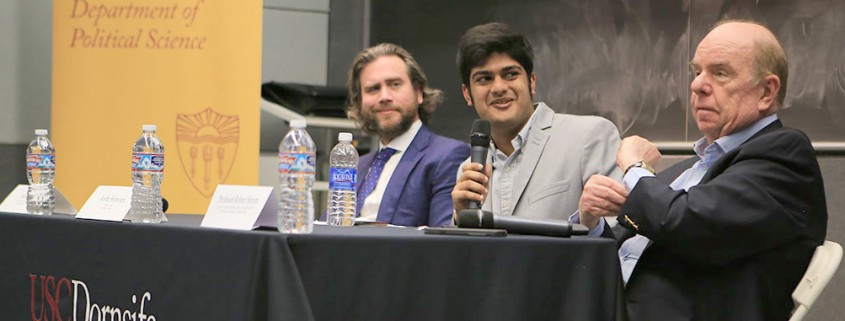Unruh hosts viewing of Republican debate
In a continuation of its event series covering the presidential race, the Jesse M. Unruh Institute of Politics hosted a panel and watch party for the Republican Debate on Thursday night. Students gathered in the Montgomery Ross Fisher building to watch the debate between the final five candidates for the Republican presidential nomination.
The event began with a panel discussion moderated by Unruh Institute director Dan Schnur and Daily Trojan editorial director Sonali Seth. The panel featured political science professor Robert Shrum, a former Democratic political consultant; Daily Trojan editor-in-chief Anshu Siripurapu; and Justin Wallin, COO/CMO of Probolsky Research.
In their discussion, the panelists focused on how presidential candidates can unseat front-runner Donald Trump from his position. With Super Tuesday — the day when half of the delegate votes will be awarded — looming, the panel discussed the strengths and weaknesses of Trump as a candidate.
“When it comes down to it, there has to be something that balances off a visceral distaste,” Wallin said. “[Trump] is just one-dimensional.”
The panel also discussed the future of the Republican party as its candidates jockey back and forth for a dominant position in the race. In the midst of the party’s debates, the panelists pointed out that the platform of the Republican party remains in question.
“It’s a party struggle; it’s an identity crisis,” Schnur said. “We’ll see tonight how they work that out.”
The first moments of the debate addressed the issue of immigration, a heated topic of debate for Republicans throughout this campaign process. Early on, fellow Republican presidential candidates Ted Cruz and Marco Rubio established an attack plan of gunning for Trump, throwing insults and targeting both his past and his current policies fervently.
After immigration, the moderators moved onto the replacement of the Supreme Court Justice seat left empty by the death of Antonin Scalia. Each of the candidates took a moment to acknowledge Scalia’s role as a solid rock for the conservative vote in his time on the Supreme Court.
Rubio brought up concerns about whether Trump will stand true to conservative ideals, especially due to his support of Planned Parenthood and his neutrality on the Israeli-Palestinian conflict. He pointed to both of those less conservative positions as reason to doubt Trump’s ability to select a new Supreme Court Justice. Despite these types of attacks, however, the panel did not believe that the candidates were able to slow Trump at all.
“They’ve thrown the kitchen sink at Trump; if he survives, what else does the Republican party have?” Shrum said. “They’re nicking him, but I’m not sure if it’s having a big effect.”
The debate often digressed into arguments about tax returns, with Rubio and Cruz questioning Trump’s decision to not release his returns. Trump defended himself, saying that he was currently being audited and therefore could not release his returns. This was a topic of lengthy conversation, which the Unruh panelists believe only sidetracked the conversation and weakened the debate.
The final half hour of the debate focused in on smaller items of interest, such as the Apple court order, while returning to topics such as national security and immigration. Part of the debate dissolved into Rubio, Cruz and Trump yelling over one another. Though they believed that Rubio and Cruz made small ground in certain areas, the panel was in agreement that the debate did nothing to diminish Trump or to boost the Republican party as a whole.
“They haven’t gained in contrast to Trump,” Wallin said. “You can see him inflating with all the glancing blows. None of them stuck, and they wouldn’t stick to anyone. It’s hard to know what can be done to beat him. It’s almost who’s the bigger bulldog than who has a better argument.”

